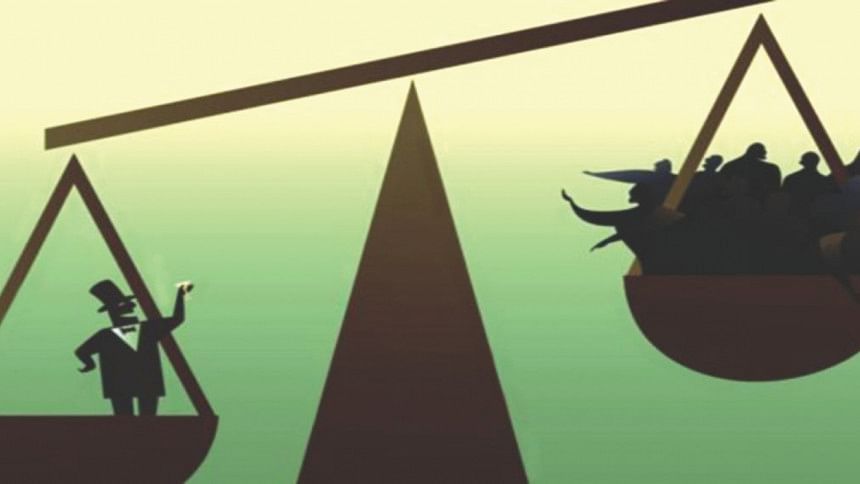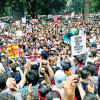Cap-Dem-Rel

Capitalism prioritses policies that promote efficiency in resource allocation, while democracy espouses ideas of equality and fairness. Capitalism focuses on autonomy, individualism, and a particular brand of [economic] success, while democracy focuses on community and participation of the people in matters that govern them.
The two constructs are "ideologically" at odds. So, how have they come to co-exist?
Short answer:
In tension.
Slightly more elaborate two-part answer:
A.
Democracy and capitalism can co-existent because they are inter-dependent.
Capitalism allows people to have wealth, which in turn allow them time to participate in community action and political discourse, supported by income-generating media houses and education systems. Capitalism also furthers the idea of individual responsibility that can collectively benefit the rest of society (trickle down effect).
Democracy is well-positioned to provide capitalists with favourable laws, regulations, and safety nets, while capitalists, with their resources, have the financial power to influence policy via lobbying and campaign donations during elections. In some countries such practices are institutionalised. Such as the United States. In others, like Bangladesh, some call it favours or quid pro quo. Or simply, corruption.
This inter-dependency between democracy and capitalism means that the purveyors of democracy and capitalism look out for the other, which allow both systems to survive, even flourish.
[There are plenty of examples of this: In 2007 the housing bubble burst in the United States because of deregulation of financial institutions. This burst was to be remedied by the Emergency Economic Stabilization Act of 2008 (aka the bank bailouts) that Obama's government introduced. The goal of the Act was to ensure that the economic system doesn't collapse. Great move, sure. But, we also saw how low-income individuals who went bankrupt did not receive similar kinds of bailout packages. The financial institutions received assistance, none of which were transferred to the individuals who lost their homes.]
But, one might ask, what does this inter-dependency between capitalism and democracy mean for people? Well, they are pulled in opposite directions; as they strive to gain control over their political rights, they are having to give up control over their economic rights – it is a battle between personal and property rights, a conflict between the social roles of citizens versus that of consumers. The fallout is that citizenship becomes synonymous with consumerism; consumerism surreptitiously eclipses citizenship. (Think about the number of pink-coloured products that people are told to buy to "support" breast cancer research). People's values as citizens are drawn upon to enhance consumerism, which then becomes a pseudo act of citizenship. Economic forces, thus, impinge on peoples' ability to govern themselves in ways that best serve the democratic value, vis-a-vis the collective.
These contradictions between democracy and capitalism are arguably the sources of the tensions we see worldwide – social unrest across the world, the collective uprisings, the monetary crises in Europe, Brexit. In Egypt, we have seen how capitalism and democracy together became a threat to sovereign and autonomous nation state. In Turkey, we have seen how democracy can easily be threatened by military coups in a capitalist world, which then has its own repercussions, clamping down on academic freedom being one.
B.
Democracy and capitalism are able to co-exist because individuals have multiple selves that support each other. The self-framework consists of the personal self, the relational self, and the collective self. Each "self" can find affinity with the other selves by accepting capitalism and democratic principles at the same time.
Let me briefly elaborate.
The personal self is able to fit its unique identity into the capitalist structure that prioritizes the self, individuality, individual freedom, and individual hard work that leads to individual success. This fit allows the individual to find credence in his personal-self.
On the other hand, the relational and the collective selves are based on group membership; that gives individuals a place in the social world. These relational and collective selves are validated by democratic principles that promise individuals a voice – a collective voice -- and rights that may be deemed good for the collective.
There is, thus, a tension between the human need for unique individuality i.e. being their personal selves and their need to be part of something bigger than themselves, i.e. being their relational or collective selves.
In other words, there is a conflict between potential identities that arise between needs to identify as a unique or distinct individual versus being embedded in a relationship or being affiliated to a group. Indeed, those who are "lone wolves" – completely different from everyone else -- have a similar degree of discontent (even if it varies by type) as those who lack "self definition" because of the de-individuation that occurs when one's key identity is that of a group member only.
The question is then, how is this tension resolved?
Optimal distinctiveness theory (Brewer 1991) suggests that that individuals negotiate between these multiple selves by inculcating both uniqueness and affiliation. But, there is trajectory. It is when individuals' need for affiliation is satisfied that they emphasize their individual identity over their relational (or collective) identity. Optimal identities satisfy the need for affiliation and distinction within the group and between groups.
In effect, optimal social identities involve shared distinctiveness. This allows individuals to select group identities that are inclusive enough to foster a sense of belonging but exclusive enough that they provide some basis for distinctness from others.
So…
What do we do when a perverted version of religion – an extremist, annhilist form – enters the milieu? Does our need for shared distinctiveness support the joining of such distinct organizations? Or, do we apply capitalist principles to the practice of religion, thus commodifying it? Or, do we apply our democratic principles and push against the perversion?
That's what we need to think about.
The writer is Assistant Professor at the School of Social Work, University at Buffalo.

 For all latest news, follow The Daily Star's Google News channel.
For all latest news, follow The Daily Star's Google News channel. 








Comments